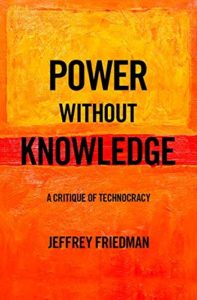Jeffrey Friedman spends a significant amount of time in Power Without Knowledge concerned with the epistemic complexity of society. But what does he mean when he says society is epistemically complex, and what factors make this the case?
Freidman does not merely mean that social problems are complicated or difficult. Physics is complicated and difficult, but it can still be understood well enough by people of adequate intelligence and training to land probes on comets or smash protons together head-on at nearly the speed of light. However, technocracy cannot be made successful by “technocrats’’ use of the methods – however one might define them – that are successfully deployed by physicists, chemists, biologists, and so on.” The task of a technocracy is qualitatively different from these fields:
A successful technocracy presupposes knowledge of a different kind, knowledge of human behavior: that is, knowledge of how to control human action effectively, hence knowledge of how to predict the outcome of manipulating it—which is what all technocratic policies do…If they lack [this knowledge], however, then they will not be able to produce accurate forecasts of the effects of technocratic measures on the problems they are intended to solve, mitigate, or prevent.
This, however, raises a new question. Why should human behavior be so difficult to predict? The difficulty lies in the fact that each individual human’s behavior is shaped by their own ideas and interpretations of their circumstances – and those ideas and interpretations are unique to each person. Friedman lays out three theses building up to this:
Thesis 1 (interpretive determinism). At least insofar as an agent is acting deliberately, her interpretation of which action is advisable under her perceived circumstances will determine the action she takes.
Thesis 2 (ideational determinism). An agent’s interpretation of which action is advisable under her perceived circumstances will be determined by the web of those of her ideas that seem (to her) relevant to (a) the circumstances themselves, (b) the purpose of actions that (for her) count as normatively advisable in those circumstances, and (c) the effects that seem (to her) likely to be produced by such actions in those circumstances. Also playing a part will be the implicit assumptions and other tacit ideas that stand behind ideas about (a), (b), and (c).
Thesis 3 (ideational heterogeneity). The ideas, and thus the interpretations, that determine agents’ deliberate actions, as well as the ideas of the technocrats attempting to predict and control the agents’ actions, vary from person to person to some extent, making each person’s actions somewhat unpredictable to the others.
Ideational heterogeneity is, to Friedman, the primary obstacle facing technocracy:
If there is ideational heterogeneity, it would tend to produce some degree of behavioral unpredictability, given the other two theses. Ideational heterogeneity between my web of beliefs and yours would keep me from knowing how you will interpret your situation, and thus how you will act in response to it. Even if I know what your situation is, then – itself a difficult matter, if you are anonymous to me, as are most agents to the technocrats attempting to predict their behavior – I cannot know how you will subjectively interpret it, and thus how you will act in response to it, if you and I are ideationally heterogeneous.
Even if we could know all the ideas someone had been exposed to in their life, simple variation in the order they encountered those ideas can produce different webs of beliefs:
Consider a 14-year-old whose first exposure to a compelling picture of society (at T1) came from The Communist Manifesto, leading her to explore longer works by other critical theorists—all interpreted through a web of beliefs initially shaped in large part by Marx; but who then, at age 18 (T2), happened to read Atlas Shrugged, followed by other libertarian writers (say, as an assignment in a college course). The interpretations of society produced by her web of beliefs at T3, when she is 22, are likely to be very different from those produced at T3 by the web of beliefs of someone who, as a 14-year-old, read Ayn Rand first, leading her to explore other libertarian writers during the next four years, only getting to Marx and other critical theorists at age 18—even if, by the time she was 22, she had read exactly the same list of works as had her counterpart at T3. For the sequence in which these works were encountered would ensure that at each point along the way, the interpretive context in which a given item on the list was read would be cumulatively and radically different between the two people.
Because effectively predicting behavior requires knowing in advance people’s reactions to their circumstances, which itself requires knowing in advance how they will subjectively perceive those circumstances and what reactions will occur to them to choose, the methods of the natural sciences cannot be usefully employed by technocracy:
From the first thesis it follows that, to the extent that technocrats attempt to predict agents’ deliberate actions, they must predict the agents’ interpretations of their circumstances. This makes the technocrat’s task much more difficult than that of the natural scientist, contra Dewey. Inanimate physical entities do not act on the basis of interpretations of how best to respond to their objective circumstances; they act on the basis of the objective circumstances themselves. Unlike natural scientists, then, technocrats need to anticipate not the objective circumstances to which behavior will respond, but agents’ subjective interpretations of how they should deal with whichever objective circumstances they find relevant to their actions (which itself is a matter of interpretation).
Statistics and probability cannot deal with ideational heterogeneity any better than natural sciences can:
The heterogeneity of people’s ideas should not be written off as random noise that can be dealt with through probability theory. Ideational heterogeneity does not have random causes that would produce a normal distribution. Idiosyncratic ideas, which is what we are discussing, are not random ideas. They are ideas that have an interpretive, path-dependent logic of their own; behavior caused by this logic is not random (although it may seem to be random because we cannot easily understand it, lacking access to the webs of belief that cause it).
As a result of ideational heterogeneity, failures of Type 4 knowledge are essentially guaranteed:
Taken together, the factors suggest that, insofar as human actions are determined by human thought, technocrats are, as a practical matter, poorly equipped to predict them. Yet such predictions are required of technocrats.
Behavior that can’t be reliably predicted by technocrats cannot be reliably controlled by technocratic policy initiatives. This runs afoul of the internal justification of technocracy:
But if we have reason to think that we cannot accurately know the results of a certain action (such as a specific technocratic action), then our knowledge of the beneficial outcome of taking that type of action cannot serve as the rationale for it, as technocracy demands, since we lack such knowledge. Likewise, if the defender of technocracy concedes that it is likely to produce unintended consequences but allows, too, that she does not know what they are likely to be, then her putative knowledge of the beneficial results of technocracy (the prevention, alleviation, and solution of social problems) cannot serve as the rationale for it, for she lacks knowledge of what lies on the cost side of the ledger.
Technocratic expertise faces internal challenges as well. We’ll look at Friedman’s evaluation of this in the next post.
Read Parts 4, 3, 2, and 1 of this series.
Kevin Corcoran is a Marine Corps veteran and a consultant in healthcare economics and analytics and holds a Bachelor of Science in Economics from George Mason University.



READER COMMENTS
Richard W Fulmer
Jan 21 2023 at 8:20am
Technocrats don’t need to predict how people will behave if they can control them, which explains why totalitarian countries are filled with walls – both physical and metaphorical.
Mactoul
Jan 22 2023 at 12:01am
Can’t the matter be simply stated as possession of free will by human beings?
Kevin Corcoran
Jan 22 2023 at 8:51am
Hey Mactoul –
No, the subject of free will wouldn’t shift the argument here one way or another. This is because free will is a separate topic from predictability. Having free will doesn’t entail behaving unpredictably as a necessary truth, nor does the ability to predict behavior negate free will. It could be the case that there is an agent with free will whose behavior we can nonetheless easily predict (like a perfectly logical Vulcan), and it can be the case that there is an agent without free will whose behavior is nonetheless unpredictable to us (like a Klingon driven to act by pure impulse). Both of those options exist in the logical space, and neither of them entail an internal contradiction. Klingons might behave unpredictably while Vulcans are easily predictable, but this wouldn’t entail that therefore Klingons have free will and Vulcans don’t.
Kevin Corcoran
Jan 22 2023 at 10:03am
Or, to put it another way –
Economists are big fans of the law of demand. That is, roughly, the idea that demand curves slope downward, such that as the price of something increases, people will consume less of it. But believing that people will predictably decrease consumption in the face of increased prices doesn’t commit one to rejecting free will, because there’s no inherent reason to believe that freely chosen behavior will necessarily entail behavior that is unpredictable or random.
Jon Murphy
Jan 22 2023 at 12:32pm
Good point, Kevin. I was at a conference recently where Bart Wilson (an economist at Chapman University) made your point in a snappy way: “Incentives matter, but the incentives didn’t make you do it”
Comments are closed.